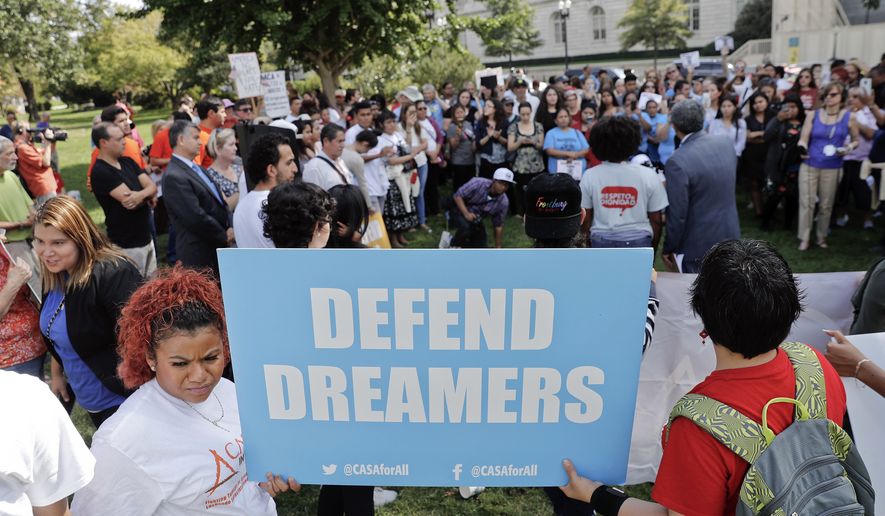More than 75 percent of illegal immigrant “Dreamers” who are eligible to renew their Deferred Action for Childhood Arrivals program status under Trump administration’s phaseout of the Obama-era deportation amnesty reapplied in time for Thursday’s deadline, the government said.
Of the 154,000 people who could have renewed, some 58,000 had submitted applications by Sept. 5, when the administration announced the rollback. Another 60,000 had applied between then and midday Thursday, and applications were being accepted by courier up until the stroke of midnight, said U.S. Citizenship and Immigration Services.
Still, that would leave tens of thousands who either declined to renew or weren’t able to get their applications — or nearly $500 fee — together in time to make the deadline, drawing outrage from immigrant-rights groups who called the timeline “arbitrary.”
Frank Sharry, executive director of America’s Voice, said the administration was showing “chaos and cruelty” by enforcing the deadline. He also said he hoped it spurred Congress to quickly approve a bill granting them eventual full citizenship rights.
“The stakes are high, the threat is real, the crisis is now,” he said. “The question is whether the Republicans in Congress will create a bipartisan path forward.”
At least two activist groups filed new lawsuits Thursday challenging the phaseout of the DACA program.
They argued the administration didn’t do enough to alert people the program was ending, and said they fear the information illegal immigrants turned over to the government will now be used to facilitate their deportation.
“The DACA program asked these young people — who came to this country with no intent to violate the immigration laws — to trust the government with highly sensitive personal information. It would be unconstitutional, as well as unconscionable, for the government to betray their trust,” said John A. Freedman, one of the lawyers who helped file the lawsuit on behalf of Dreamers.
Trump officials have repeatedly denied plans to target Dreamers, and say they have kept the same policy in place under the last administration, which generally shielded the information except in cases of major crimes, gang activity or other security concerns.
USCIS declined to comment Thursday on the ongoing legal battle.
DACA was created by President Obama in 2012, after he was unable to get Congress to deliver on legislation to grant illegal immigrants citizenship. Mr. Obama had previously said he didn’t have the power to act, but reversed himself amid his re-election campaign, as he was seeking Hispanic votes.
The program — which approved more than 92 percent of those who applied — granted a two-year stay of deportation, and issued work permits entitling illegal immigrants to driver’s licenses, Social Security numbers and some taxpayer benefits.
The two-year permits were renewable, but Mr. Trump’s decision ends that. Those already approved will keep protections for the rest of their time, but after Thursday’s deadline no new applications will be accepted.
Anyone whose permit was to expire before March 5 was able to apply for a two-year renewal, but the applications had to be in by Thursday.
The only exception was cases from Puerto Rico or the U.S. Virgin Islands, where USCIS said it would consider case-by-case deadline extensions because of Hurricane Maria.
The Trump administration says phasing out DACA was the most humane approach, saying even Mr. Obama recognized the program was legally tenuous. Trump officials said the six-month phaseout gives Congress a chance to pass a more permanent solution, and said it’s better than having a judge halt the entire program instantly over legal concerns.
A number of proposals have already been suggested in Congress for permanent status for Dreamers.
Sen. Jeff Flake, Arizona Republican, offered his own plan Thursday, calling for anyone who was approved for DACA to be able to apply for a 10-year conditional status, which would eventually lead to legal permanent residence and then citizenship, as long as they pursue an education, hold a job or join the military.
Mr. Flake coupled the legal status with stiffer enforcement provisions against criminal gangs, and with $1.6 billion in money for a first installment of Mr. Trump’s border wall proposal.
• Stephen Dinan can be reached at sdinan@washingtontimes.com.




Please read our comment policy before commenting.